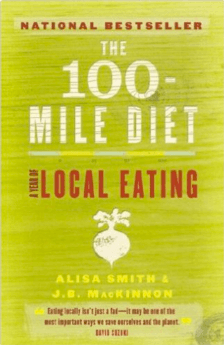Book Review: The 100 Mile Diet (at last!)

I thoroughly enjoyed reading this book, The 100-Mile Diet: A Year of Local Eating, and actually stayed up late a couple of nights to keep reading. It’s a topic that fascinates my nutritionally minded, health-nut brain, and inspires me to re-evaluate much of what I am buying. I did not agree with everything in the book, especially as it is not written by Christians, but yet I was inspired by this quest, and all of the issues that it brought to light.
For those who missed the beginning of this review, the basic premise of the book is a Vancouver couple who decide to spend 1 year eating only local foods, from within a 100 mile radius of their home.
The experiment forced them to look beyond their regular food sources, their regular diet, their regular conveniences. They learned to eat seasonally, a habit that many of us would do well to learn. Not only is it easier on the budget, but it also improves nutrition (as foods retain their full nutrition when eaten ripe, without having to be transported, and often needing less sprays), enhances our appreciation of seasonal variety and change, and supports the local farming community and thus, local economy.
For the first time, they recognized the need to enjoy the bounty of fresh produce in season, and to preserve it, thinking ahead of the lean winter and spring months. They traveled around within their 100 miles, to discover from traditional farmers the abundance of varieties of vegetables, fruits and other crops that used to and can still be grown in our local area, despite what we now believe are our “local crops”. I learned that my local region (being from the same area as the authors) is able to produce and sustain crops ranging from berries to fruit trees and vines to vegetables and herbs to all manner of animals and fish to nuts and even (very surprisingly to me) grains, including wheat! And yet, how much of my produce comes with labels stating “Grown in California”, or Mexico, or Wisconsin. How unnecessary!
Buying and eating food has become so far removed from what is used to be. No longer do we pick vine-ripened tomatoes from our gardens for dinner, and bring in a litre of fresh milk from the barn, or spend a day in the fall canning pumpkins for the winter. Instead, we trot off to the local supermarket, to purchase half-ripe hothouse tomatoes, and sterilized milk from a plastic jug, and buy pre-canned and pre-flavored pumpkin pie mix from a shelf.
Do I appreciate the convenience of modern foods, of greater variety (in and out of season), of not being responsible for producing all of the food that my family needs to sustain us through the winter months? Yes. Do I take advantage of being able to run to the store to just pick up a bagged salad and bottled dressing? Sure. Is my husband glad to not have to wake up at 5am to milk the cows, and feed the chickens, and instead to put on a dress shirt and tie and do marketing work from his laptop? You bet (he reminds me often that he was not meant to be, nor will ever be, a farmer)!
And yet this book wasn’t about idealism, or going back in time. It was simply a rediscovery of some things that we have lost sight of, and a yearning for a return to natural simplicity and wholeness in the ways that we obtain that which nourishes us. So much food for thought.
What are your thoughts? Have any of you read the book, and what did you think of it?






Stephanie,
Thanks for referring me to this book. I’ve added it to my list.